If you’ve been shopping for hiking or backpacking gear recently, you may have noticed some women’s specific gear. I’m not talking about clothing or shoes (obviously we need those)… I’m talking about backpacks, sleeping bags and more. Often this stuff seems to follow the same tired formula: “Shrink it and pink it”. Brands make the same outdoor gear they make for men, but in smaller versions and in shades of pink (or purple, or baby blue) and call it women’s hiking gear.
But gear for women has been getting better. The outdoor industry is waking up to the fact that women do actually get outdoors. And some of that women’s specific gear is actually designed with women in mind. I have a lot of experience evaluating gear (both on the trail and as part of my old day job), so here’s my take on which women’s hiking gear is actually worth buying. (And which things you can just buy unisex.)
Hey there: Some of the links in this post are affiliate links, which means I earn a small commission at no cost to you. Thanks for your support. -Taryn
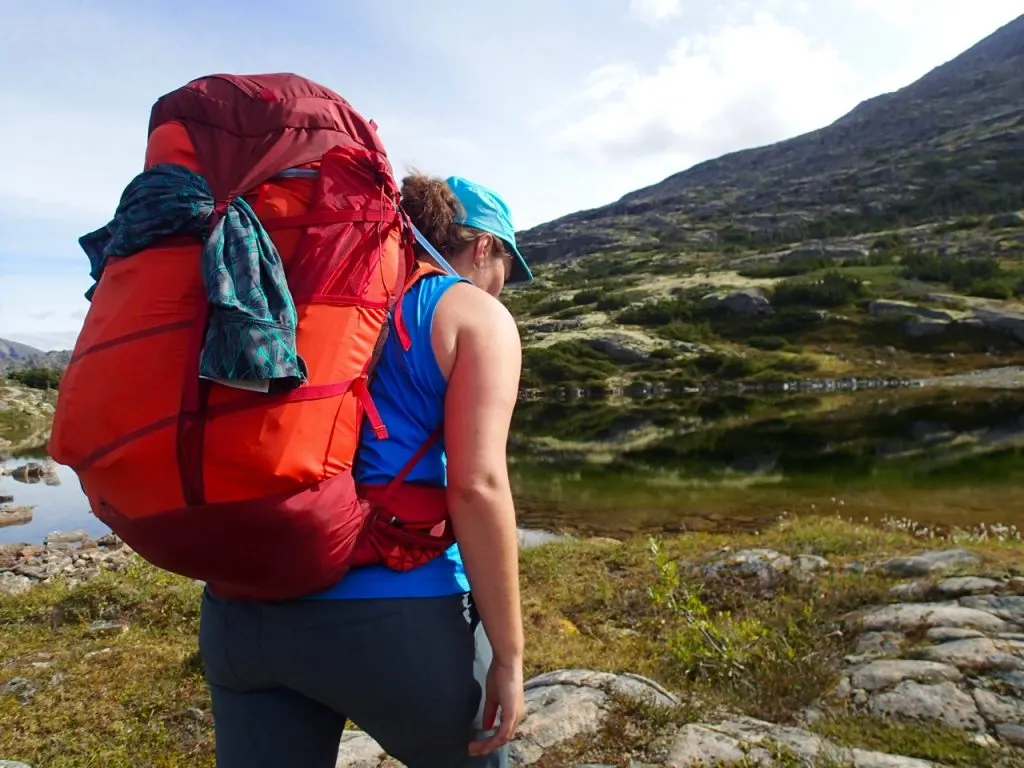
Women’s Hiking Gear: Backpacks
Women’s specific backpacks are designed to fit the smaller, curvier body of the average woman. Compared to men’s or unisex packs, they usually come in shorter torso lengths. They also have narrower shoulder straps that are set closer together to fit women’s narrower torsos. The shoulder straps are also often contoured or curved to accommodate breasts. The hipbelts of woman’s packs are shaped to accommodate a woman’s wider hips. If you are just buying a day hiking pack, a great fit is not as important since you won’t be carrying as much weight. But if you are going on an overnight or multi-day backpacking trip you will be carrying lots of weight and you want the best fit possible. Below I’ve given some pack fitting tips for various female body types.
If you are a short woman, you will definitely benefit from a women’s specific pack. Men’s packs generally will not fit you well as their torso lengths will be too long.
If you are a petite/thin woman you will also want to consider women’s packs since the shoulder straps on a men’s pack will be set too far apart for you and the hipbelt may not do up tight enough.
If you are a curvy woman then you are in luck as women’s packs were designed to accommodate your hips and breasts. You could try on a men’s or unisex pack, but you will find that the hipbelt on a men’s pack doesn’t sit in the right place on your hips and the shoulder straps sit strangely on your breasts.
If you have a very straight up and down figure (not curvy) and aren’t short or super thin, you might not get any benefit from a woman’s pack. Mens or unisex packs will come in a small enough torso length to fit you and the unisex hipbelt should fit you fine.
If you are very tall (over 5’9ish) or you have a very long torso, you also might need to consider buying unisex pack. Women’s packs typically don’t come in sizes tall enough to accommodate you. (Sorry!)
If you are very short (under 5’2ish) AND you aren’t very curvy, consider looking at the youth packs. They are designed for tweens and young teens and they can often be much less expensive. (There is a tradeoff though as there aren’t as many youth packs to choose from, they aren’t designed to carry heavier loads and they often have less features.)
I recommend: I’m a curvy woman of average height. For backpacking, I wear the women’s version of the Boreas Lost Coast 60 (you can read my review here). Most of the day packs I own are also women’s specific. For summer I usually use my Greogry Maya 22 (I have an older version). Check prices: REI. For winter I switch to a Deuter Freerider SL that has straps to carry my snowshoes. Check prices: REI.
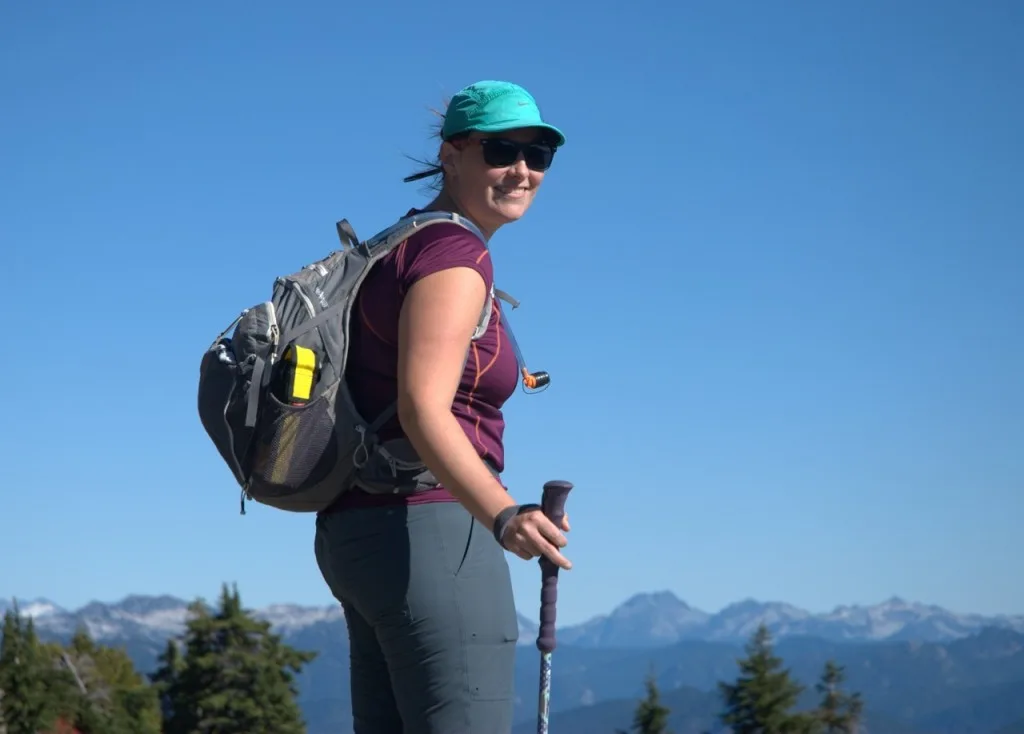
READ NEXT: 17 Ways to Save Money on Hiking Gear
Women’s Hiking Gear: Sleeping bags
Sleeping bags for women are designed to fit the shape of a woman’s body AND to account for the fact that women generally feel the cold more than men. Women’s sleeping bags are generally offered in shorter lengths than men’s or unisex bags. Women’s sleeping bags are often offered in two sizes. The smaller size will fit up to 5’4″ or 5’6″ and the larger size will fit up to 5’8″ or 5’10”. Men’s bags are typically offered in 6’0″ and 6’6″ sizes. Empty space in a sleeping bag will just make you colder so you do want to choose a sleeping bag that is only an inch or two taller than you.
Slim cut mummy-style sleeping bags for women also have a bit more room in the hips compared to men’s bags. Since women often sleep colder than men, women’s bags often have more insulation in the torso and in the footbox – areas where we feel the cold most.
I recommend: If you are curvy, or you feel the cold easily, a women’s sleeping bag might be the right choice for you. I’m curvy and feel the cold a LOT so I use a women’s specific Big Agnes Roxy Ann -9C/15F sleeping bag. Check prices: REI. In the past I have also used a unisex down sleeping bag from MEC.
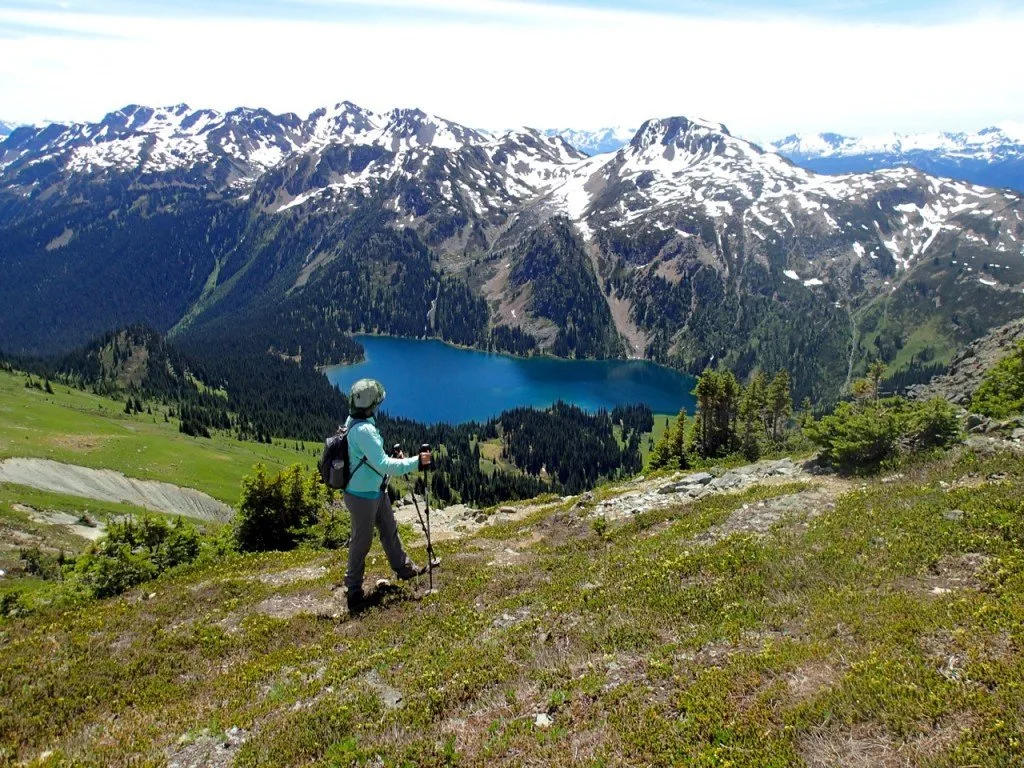
Women’s Hiking Gear: Sleeping Pads
Like sleeping bags, women’s specific sleeping pads are designed to fit women’s shorter bodies and keep them warm. Women’s specific sleeping pads come in shorter lengths than unisex pads and have more insulation through the torso and footbox. Self-inflating sleeping pads for women may also have more foam in the hip area to make it more comfortable for women with prominent hips to sleep on their sides.
There aren’t that many women’s specific sleeping pads on the market. Most unisex pads come in shorter lengths that would suit shorter women. As well, unisex pads often come in versions with higher R-value ratings to offer more warmth. In general, women are probably fine to just pick a unisex sleeping pad in a length that suits them as long as they choose a higher R-value pad. I recommend an R-value of at least 4 if you tend to sleep cold.
I recommend: I use the Therm-a-rest NeoAir Xtherm. It is a unisex pad but provides one of the best warmth to weight ratios on the market. (It has an R value of 5.7 and weighs just 430g!) I used to use a Therm-a-rest ProLite Plus women’s version, but the NeoAir is far superior. No contest: the NeoAir Xtherm is lighter, more compact, more comfortable and way warmer. Check prices: REI.
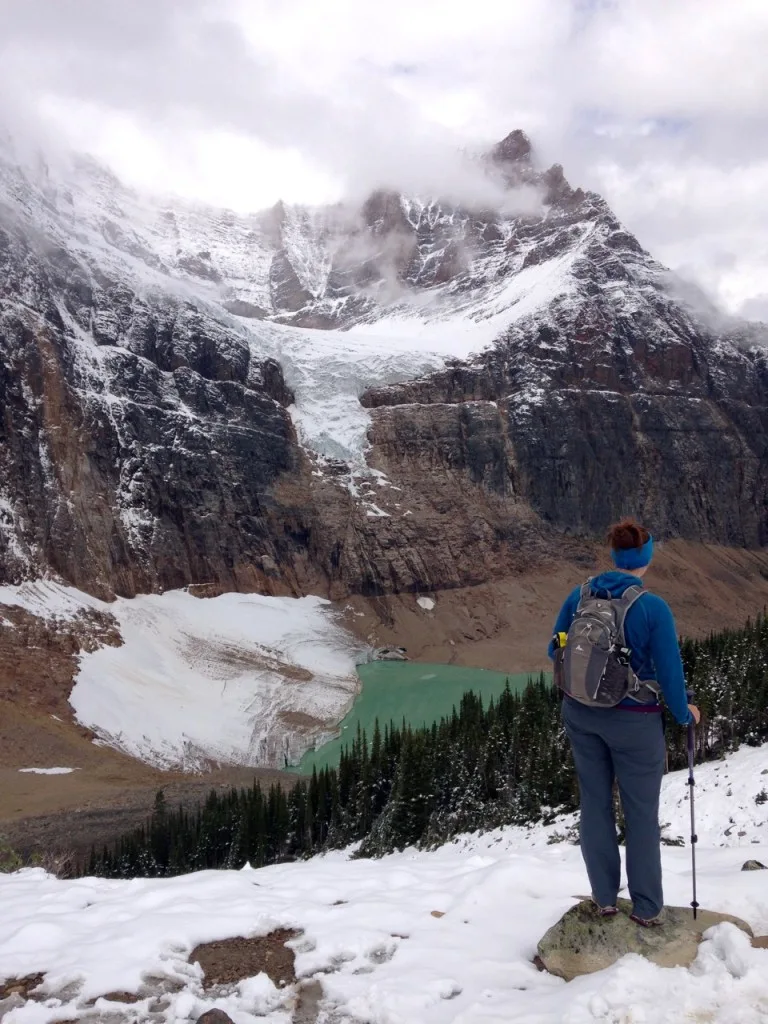
Women’s Hiking Gear: Trekking Poles
Women’s specific trekking poles come in shorter lengths since women are generally shorter than men. As well, they have grips and straps that are better sized for women’s smaller hands.
I wouldn’t worry too much about buying women’s specific trekking poles unless you have very small hands. Unisex trekking poles are height adjustable so they will work for shorter users as well as tall ones. On average, women’s trekking poles have a maximum length that is about 15cm (6 in.) shorter than unisex poles. If you also use your trekking poles to construct a tarp shelter, this extra length can be nice to have.
I recommend: I have small hands so I use an older version of the women’s specific Black Diamond Trail poles. I find that I can get the straps to adjust small enough to actually fit my wrists and hands – unlike the ones on unisex poles that I’ve tried. Check prices: REI.
The next time you hit up your local outdoor shop, keep these guidelines in mind when choosing women’s (or unisex!) hiking gear. Which women’s hiking gear do you own? Tell me if it was worth it in the comments.
Read Next:
- Women’s Plus Size Hiking Clothes: The Best Brands and Where to Find Them
- 12 Best Women’s Hiking Pants (Picks for Every Body Type)
- How to Camp and Hike on Your Period
- Complete list of the backpacking gear I actually use
- 20 Women’s Adventure Books That Will Inspire You
- 80+ Women’s Adventure Films You Can Stream
- 17 Ways to Save Money on Hiking Gear
- Best Hiking Leggings of 2022
- Lake O’Hara Packing Lists for Hikers and Campers - April 25, 2025
- BC Parks Day Passes 2025 – Everything You Need to Know - April 24, 2025
- Best Women’s Hiking Pants (Picks for Every Body Type) - April 21, 2025

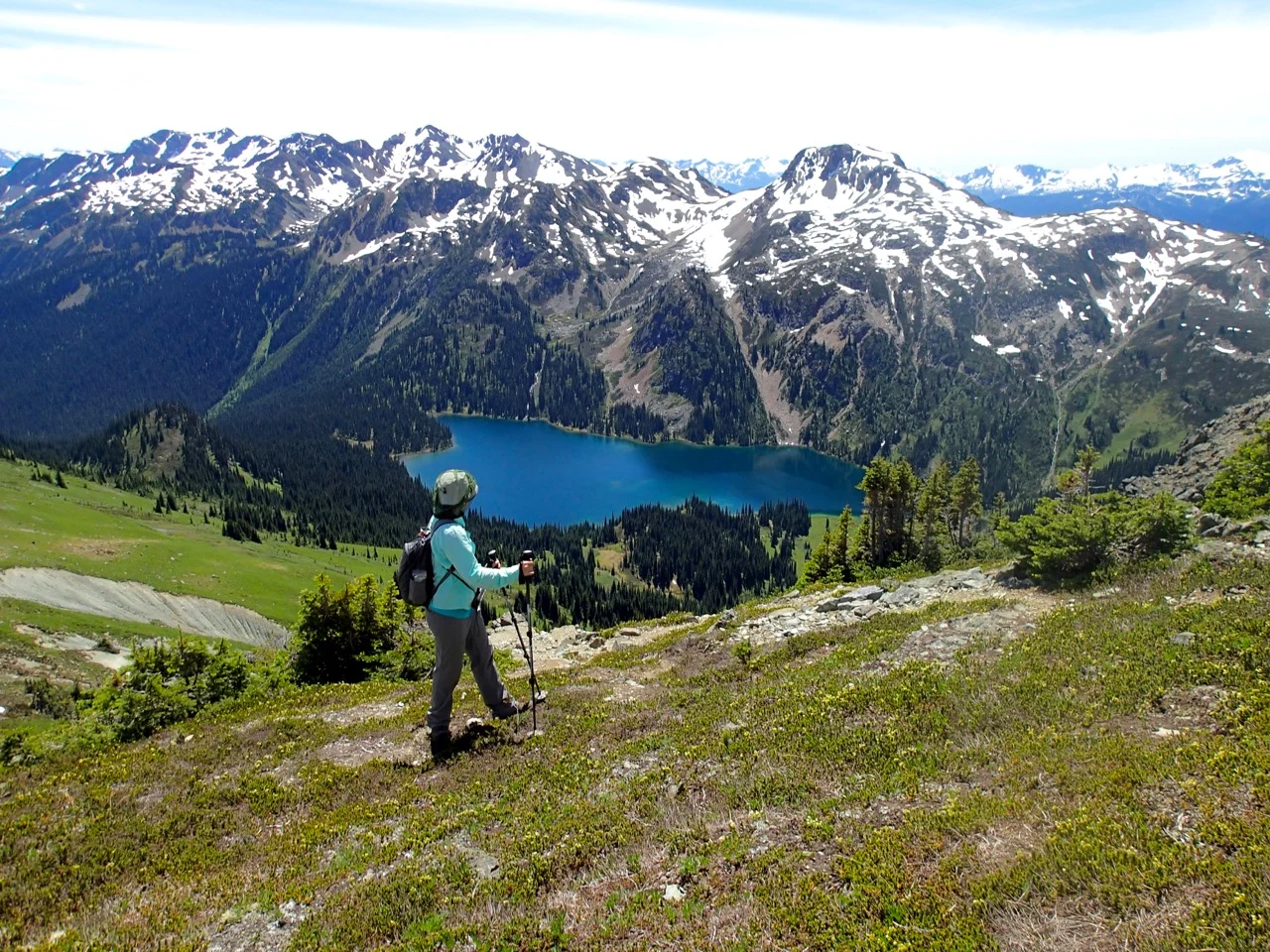
Sean
Tuesday 5th of December 2023
Taryn do you use/recommend a sleeping bag liner to help with warmth? Thanks, Sean
Taryn Eyton
Wednesday 6th of December 2023
Most sleeping bag liners are designed to help keep your sleeping bag clean and feel more comfortable against your skin. Most do not add much warmth. There are a few fleece liners that can add warmth, but at most they can only add a few degrees, which isn't worth it to me. For cold conditions, I use a warmer bag. If that's not possible, I wear warmer base layers and if necessary, my down jacket. I also have a lightweight rectangular quilt that I can drape across my bag and my husbands bag to add warmth.
Danielle Vincent
Saturday 29th of April 2017
This is a great read! My nine year old and I are thinking about doing overnight trips. Gear is so overwhelming! We are doing a lot of research at this point! Thank you!!
Taryn Eyton
Saturday 29th of April 2017
I'm glad it was helpful Danielle. Feel free to ask if you have any questions while researching gear for you and your kid. I'm happy to help.
Ioanna
Thursday 13th of April 2017
Well written, Taryn! I have a female backpack (Deuter Aircontact) and I love it. I'm about 5'3 so choosing women-specific backpack was a good idea. I have a pretty wide shoulders/chest but definitely not a male-sized. Although I might look into youth packs in the future, they are rare to find in my place, though. I also don't care about women-specific trekking poles, don't see a point. My sleeping bag now is a custom made down bag which I "co-created" with the maker, exactly to my size and need, so I absolutely love it. I am planning on getting a new sleeping pad, as the one I have now is really heavy... I think I will get NeoAir, for the weight and R-value. Happy Hiking! Ioanna (A Woman Afoot)
Taryn Eyton
Thursday 13th of April 2017
I'm glad you liked the post. I'm interested to hear more about your custom sleeping bag! How did you make that happen? Do you have a post on your site about it?
Norine
Tuesday 11th of April 2017
I love my women's specific backpack. I have a Deuter, but it lacked a few features, do went to REI in Seattle and found my Venus, which I love. I think they have more selection down south for women, at least when I was looking. It's worth checking south of the border.
Taryn Eyton
Tuesday 11th of April 2017
I agree - there can be more selection in the US - they have way more brands available and they have bigger stores that can offer more brands in the same place. The Seattle REI flagship store is amazing! But for me a product has to be highly recommended for me to take a chance on paying US prices for a product that I'm not sure will work for me. It's always a gamble I guess.
Hannah H
Tuesday 11th of April 2017
Thanks for sharing your research and experimentation! My favourite female-dedicated outdoors gear piece would have to be my backpack. It's a Gregory Jade 28 and although I struggled somewhat lengthily with the idea of buying a Certified Women's piece that is decorated with typical pink and Soft Female Blue highlights, it works well with my body. The thing about it that I like is the extremely supportive hip braces. They fit my hips well but also provide much more (much needed, I'm carrying breasts as well as pack supplies) shoulder relief. The pack is 28 L which is small for such dedicated hip or waist supportive straps and usually men's or unisex packs will only give it to you if you are carrying a heavier load. This pack has proven sturdy and supportive for long day trips and doesn't exasperate shoulder pain from big breasts. If you can find a backpack that, ideally, has a colour that doesn't make you think of gender at all and is as supportive as this one is- you're gonna be hopping up those hills twice as fast as your male product-equipped counterparts because of the comfort performance this female product can give.
Taryn Eyton
Tuesday 11th of April 2017
I also have a Gregory Jade - I have the very first version of the Gregory Jade 50 and it's a nice green colour that doesn't scream girly gear. I like Gregory packs a lot and I think they have done a good job with their fit.